I Made a Linguistics Professor Listen to a Blink-182 Song and Analyze the Accent
Two decades have passed since pop-punk exploded in the American music scene, yet the quintessentially suburban, teen-centric music still seems to bounce around our collective skulls. Of all the elements of the Clinton-era mutation of punk music that embraced skate and surf culture, mild angst, goofiness, and incredibly hooky, catchy music, it’s the vocals that we remember. The very specific accent used in the mega-hits of the genre seems to still have a hold over anyone who was a teenager between 1993 and 2003: On Twitter you’ll see jokes made about the “pop punk voice” used by bands like the Offspring, New Found Glory, Avril Lavigne, and, especially, Blink-182. Their accents are a relic as strong as the Valley Girl voice.
There’s a whole Tumblr called Tom DeLonge Lyrics, dedicated to transliterating the spectacularly strange and exaggerated accent used by DeLonge, one of the singers of pop-punk band Blink-182. An example, transliterating the song “I Miss You”:
AND AS I STARED I COUNTEHHHD
THE WEBS FROM ALL THE SPYDURRRS
CATCHEENG THEENGS AND EATING THEIR INSYDES
LIKE INDECISION TO CALL YEUUUWWWW
AND HEAR YOUR VOICE OF TREEEZAWNNN
WILL YEW COME HOME AND STOP THIS PAIN TUHNYTE
STOP THIS PAIN TUHNYTE

Blink-182 at the Whiskey in Los Angeles in 1996. (Photo: Daniel D’Auria/WikiCommons CC BY-SA 2.0)
DeLonge is an extreme example but far from the only singer in the genre to adopt a very particular accent, usually described as sneering, whining, bratty, or snotty. By the early-2000s, with pop-punk nearing the apex of its popularity, singers from all over California had influenced singers from as far afield as Minnesota, Ontario, Maryland, and South Florida, all of whom sung pretty much just like DeLonge, who grew up just outside San Diego.
What’s going on here? How did that linguistic pattern take hold? From its start, punk has played with accents, with Americans sounding like Brits and vice versa, but this voice is different.
I called up a few linguists and music historians to try to get at the heart of the pop-punk voice. But it turns out that when you make a linguist listen to a Blink-182 song, you get more than you expected. Pop-punk vocals are on the forefront of shifting regional dialects and, especially, a major vocal change happening in California in the past few decades. The three-minute pop-punk song, one of the dumbest forms of music ever conceived (in a good way, I’d say), maybe isn’t so dumb, after all.
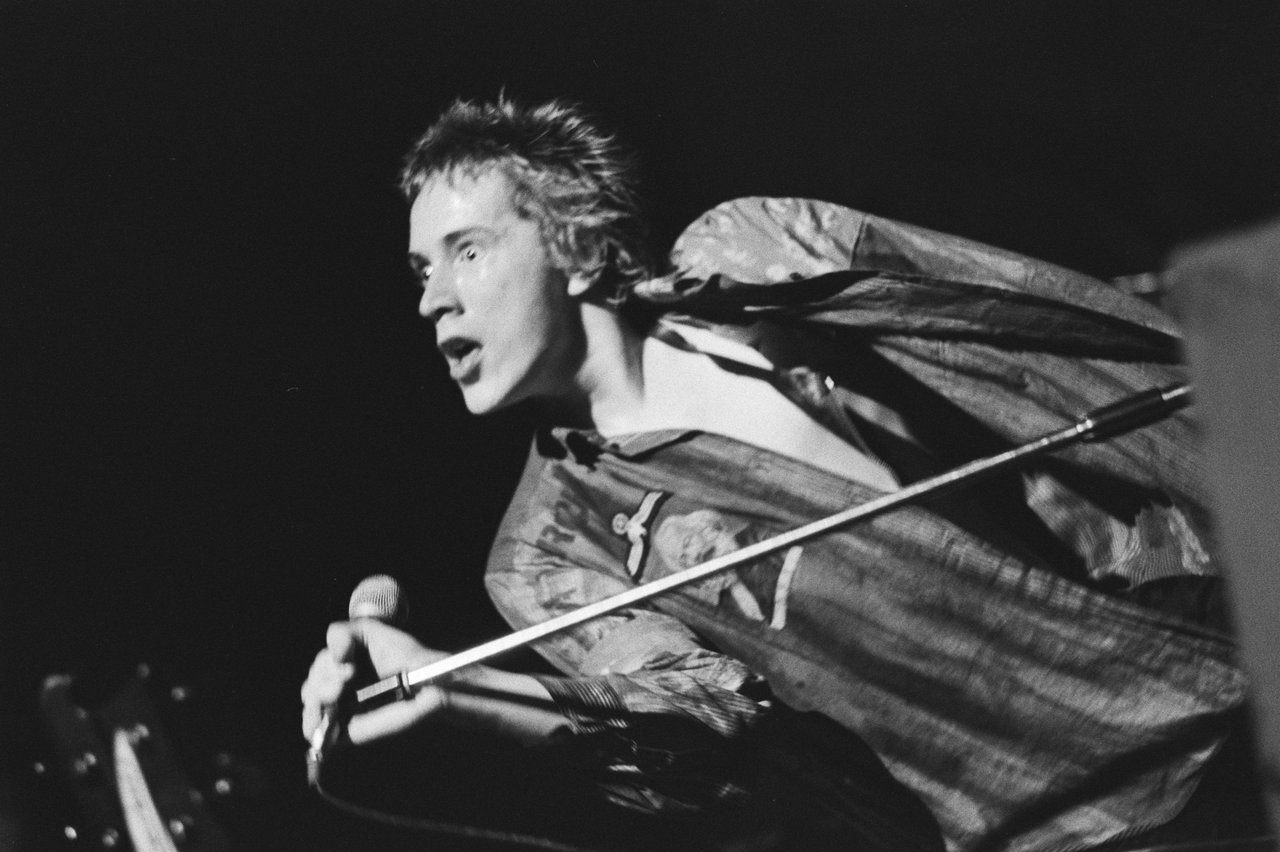 Johnny Rotten performing with the Sex Pistols in Amsterdam, 1977 (Photo: Dutch National Archives/ANEFO/WikiCommons CC BY-SA 3.0 NL)
Johnny Rotten performing with the Sex Pistols in Amsterdam, 1977 (Photo: Dutch National Archives/ANEFO/WikiCommons CC BY-SA 3.0 NL)
Singers often sing using different linguistic features than are present in their regular speech. Sometimes that’s because singers tend to adopt, usually unconsciously, the vocal stylings of the genre in which they sing. It’s been that way right from the beginning of rock and pop; those genres in their early forms were derived from African-American forms like blues and R&B, which meant that early white rock singers often adopted elements of southern black dialects. An example would be non-rhoticity, a linguistic term referring to the dropping of your “R” sounds in words like “car” and “fear.” You can hear in this Elvis Presley interview that Elvis is rhotic in his speaking voice, meaning he retains those Rs. But when he sings, those Rs disappear.
This tendency was not known to Brits who, in the 1960s and 1970s, began making inroads in America with rock and pop music. “A lot of these British singers who would drop their Rs when they spoke would actually sing, adding their Rs in, because they were adopting an American style of music and to them, that’s how Americans pronounce their Rs,” says Robert Kennedy, a linguist at the University of California, Santa Barbara who studies regional dialects. In Led Zeppelin’s “Over the Hills and Far Away,” singer Robert Plant, an Englishman, almost growls his Rs. It’s probably not a conscious choice, but that doesn’t make it any less obvious.
Americans invented punk, but early American punk, created by bands like the New York Dolls, the Stooges, the Ramones, and arguably the Velvet Underground, was a musical protest rather than a political one, railing against the silliness and pomposity of 1970s arena rock with tight, messy, three-minute pop songs. The attitude was there, and the song structure, but punk solidified when it moved to the UK, according to a history of the genre from BBC. Bands like the Clash and the Sex Pistols adopted it (along with a few other sounds, notably from reggae) for use in protesting various power structures like the monarchy and aristocracy.
They also tended to sing in aggressively local, working-class London accents, a stark difference to the Brits who came before them in the British Invasion. Robert Plant was going to sing in what he guessed was an American accent, so Johnny Rotten and Joe Strummer, in their revolt against him and their quest to reclaim Englishness from the elite, were going to sing in a hyper-exaggerated, dirty, British accent.
April Lavigne’s accent is…complicated. (Photo: Giphy.)
Pop-punk as we think of it today is easier to pinpoint. It was created in the late 1980s and early 1990s at 924 Gilman Street in Berkeley, an all-ages venue normally referred to as “Gilman.” This is where Bay Area bands like Rancid, Operation Ivy, the Mr. T Experience, and, especially, Green Day all started to get attention. Bay Area pop-punk is a kinder, gentler variety than either the nihilist Londoners or the hardcore California bands like the Circle Jerks and the Dead Kennedys that preceded them. The Gilman bands obviously worshipped the Clash, whose songs showed more craft, hooky melodies, and subtlety than, say, the Sex Pistols. Some of the bands, like Rancid, were responsible for amping up the Clash’s combination of punk and reggae into what’s now called the Third Wave of ska music.
The Bay Area community was goofier, sillier, more suburban, and more inclined to make happy, poppy music than any punk community that came before it. As an ode to the Clash, a lot of their singers adopted a sort of faux-British accent. “I’m an American guy faking an English accent faking an American accent,” Green Day lead singer Billie Joe Armstrong told Rolling Stone in 1994. Tim Armstrong, the (unrelated) lead singer of fellow Bay Area band Rancid, sings with an accent that varies song by song; sometimes it’s nearly featureless, other times it’s a Strummer-esque Brit inflection, other times it sounds nearly New York.
The pop-punk accent really became smooth and polished a little bit later, in the mid-1990s, with bands like Blink-182 and the Offspring, both hailing from Southern California. Their singers (Mark Hoppus and Tom DeLonge from Blink-182, Dexter Holland from the Offspring) totally abandoned any pretenses of Britishness. Instead they took their own accent, the California accent, and ramped it up, pushed it to new extremes. It was almost exactly what happened in London. Pop-punk singers became more Californian than the Californians.
Penelope Eckert, a linguistics professor at Stanford, is one of the foremost scholars examining what’s known as the “California Shift.” The California Shift is a linguistic theory covering the particular changes in dialect that affect the Pacific coast of the United States. Eckert was nice enough to humor me and listen several times to a song I chose based on its particularly egregious “pop-punk voice,” Blink-182’s “First Date.” I love the song, but am aware others may find it horribly annoying. “It really does sound like someone’s messing around,” she told me.

Billie Joe Armstrong from Green Day, who famously sung in a British accent. (Photo: Edvil/WikiCommons CC BY 2.0)
Regional dialects in English are largely informed by the particular way people in different geographic areas make their vowel sounds. Consonants can inform the sounds of vowels, but are largely static; going from an “F” sound to a “T” sound is a huge leap, whereas vowels are a little bit fluid, bleeding into each other. The entire game is to make sure you have enough difference between vowel sounds so that words can be distinguished from one another. But the specific sounds you make? Not so important, as long as they get the idea across of what word you’re trying to say.
A key change in the California Shift is what’s called the cot/caught merger. Northeasterners and Midwesterners pronounce those words differently, giving the former an “ah” sound and the latter an “aw” sound. “Californians do not,” says Eckert, who is originally from New York. “They have no idea. That vowel is almost completely merged. Think ‘mawwm’ instead of ‘mom.’”
Vowel sounds work like those sliding puzzle games where you have to unscramble a picture by sliding one piece of it at a time. As soon as you move one piece, you’re left with an empty space behind you, which has to be filled by something else. Californians dropped the “cot” vowel sound, pronouncing it like “caught” instead. So something had to fill that space. “The California Shift is this kind of combined change in the pronunciation of short vowels,” says Kennedy. The easiest way to think about it? Look at the words kit, dress, and trap. In the California Shift, “kit” becomes “ket”, “dress” becomes “drass”, and “trap” becomes “trop”.
Linguists talk about this shift in terms of directions; to talk with a California accent is sometimes called “trap-backing,” or “trop-bocking.” Your mouth functions like a resonating chamber. You can alter the frequencies of the sounds you make by changing the size of the chamber and by moving your tongue around. Your tongue’s placement is a major factor in dialects; it can be raised, lowered, moved to the front, or moved to the back. Californians move their tongues back, hence “trop-bocking.”

Tom DeLonge, from Blink-182. (Photo: Kerry Key/WikiCommons CC BY-SA 2.0.)
But there are some more complex things going on in the pop-punk voice. Eckert walked me through the Blink-182 song word by word, pointing out places where DeLonge was playing around with accent. “When they say ‘to pick you up on our very first date,’ the interesting thing about ‘date’ is that he renders it as a monophthong ‘dehhht’ instead of ‘date,’ says Eckert. “In most American English it’s a diphthong.” A diphthong is a vowel sound with two simpler sounds in it; for most Americans, “date” is a kind of compound vowel made up of the “eh” sound and the “ee” sound. Not so much for Tom DeLonge, who eliminates all but the “eh,” making it a single sound, or a monophthong.
The monophthong “date” surprised Eckert, as she says it’s not part of the California Shift. Except! “I’ve heard that some in Chicano English, but not so much in Anglo English,” she says. Chicano English is spoken by native English speakers of Mexican descent—it’s not a Mexican accent, because Chicano English speakers are native English speakers, but sort of their own English dialect. And that goes along with one of DeLonge’s most obvious vocal tics: changing short “ih” sounds as in the work “think” to a long “ee” sound, turning it into something like “theenk.” “Chicano English raises the vowel I to ‘ee’ before nasal consonants,” says Eckert. “So ‘theenk’ is very Chicano. And you have a lot of Anglo wannabes saying that too.”
Another very distinctive element of the California accent that’s extremely present in DeLonge’s vocals is the long “oo” sound in words like “room,” which DeLonge pronounces as something more like “rehm.” That’s almost an efficiency move; the particular combination of shapes your lips have to make to move from the first consonant, R, to the last consonant, M, plus the moves your tongue has to make to form the “oo” sound, are pretty difficult. If you move your tongue closer to your front teeth, it’s a lot less work, but you’ll change the pronunciation of “room” to “rehm.” It’s called “oo-fronting.”
There are plenty more things Eckert taught me about DeLonge’s delicious accent, but one last example would be the way Californians pronounce the letter R in certain words. In a word where the stress falls on a vowel one syllable before a word ending in R, like “whatever” or “over,” most of the country, but most noticeably those in the New York/New Jersey area, stress the consonant in the second-to-last syllable extra hard. But Californians lengthen the R. So a New Yorker will say “whatevah,” but a Californian will say “whateverrrr.” “We talk about New York/New Jersey accents as being ‘R-less’ and California accents as being ‘R-ful,’” laughed Eckert. (Linguistics jokes are pretty good.)
DeLonge does some weird, non-Californian stuff, though. His pronunciation of words like “light” and “spider” come out somewhere between the vowel sound from “rye” and “roy.” “His pronunciation of it is striking, and different from Californians generally,” says Kennedy. “It may be another attempt at projecting British punk vocals, but if I recall correctly he does this in speech as well, and so it might actually be a skate/surf/punk subculture linguistic feature.”
The influence of surfer and skater culture on pop-punk culture, and vice versa, is enormous. Bands played (and still play, I suppose) at the Vans Warped Tour, sponsored by the eponymous skateboard clothing company. Having a skateboard in a music video was pretty much required for any pop-punk artist. Skateboarding was invented in southern California, and though cities like Philadelphia and Chicago embraced the sport, skateboarding is still largely associated with the hills and empty pools and palm trees of the Los Angeles metro area.
This ties in with the linguistics of Tom DeLonge and Dexter Holland because what these guys were doing, consciously or not, was exporting Los Angeles and SoCal culture. They skateboarded, they filmed videos in swimming pools in front of palm trees, they sang in extremely heightened SoCal accents. They became brand ambassadors for the almighty brand of SoCal.
Blink-182’s ur-pop-punk voice. (Photo: Giphy.)
Those who participated in the pop-punk explosion testify to California culture’s dominance. Christopher Appelgren, who was the owner and president of Lookout! Records from 1997 to 2012, when the label folded, oversaw the explosion of pop-punk’s popularity. Lookout! was the launching pad for bands like Green Day, Screeching Weasel, and Operation Ivy, and has released records by Ted Leo and the Pharmacists, the Donnas, Rancid, and Alkaline Trio. Appelgren is a native and dedicated Bay Area resident, but he watched with some interest the explosion of popularity of the southern Californian pop-punkers. “It’s a place that feels like it makes sense to be exporting your culture to the rest of the world because that’s what happens wholesale,” he says, “In Los Angeles and Hollywood, it’s happening all the time anyway.”
Pop-punk spread quickly. Bands aping the accent and posture of Blink-182 and the Offspring (who in turn were doing their own aping and posturing) popped up all over the continent. Good Charlotte emerged from Maryland. New Found Glory came out of Florida. And, perhaps strangest, Sum 41 and Avril Lavigne exploded out of Ontario, Canada, of all places, singing songs for teens in front of palm trees.
Or maybe it’s not so strange! The California Shift has another name north of the border: the Canadian Shift. From Ontario on west to British Columbia, the Canadian accent has been rotating in much the same way as it has in California. There are differences; the classic Canadian “about,” which is more like “aboat,” is not mirrored in California. But the Canadian dialect found itself faced with the cot-caught merger, which had a similar effect on the rest of the vowels as what happened in California.
This can be very complicated for singers like Avril Lavigne. Kennedy, who is originally from Canada, thinks she might be consciously trying, as many Canadians in the U.S. do, to dial down her Canadian accent. “Interestingly she manages to pronounce the word ‘like’ (and others with the same vowel) in a non-Canadian manner, but in the first line of ‘Complicated’ (‘chill out’), the word ‘out’ sounds Canadian to me,” he says.
The linguistics professors I talked to were interested in the specifics of these exaggerated or confusingly located accents, and I do believe Eckert spent the rest of the day after talking to me watching YouTube videos of Tom DeLonge. But Appelgren, the former Lookout! Records president and punk singer, had another theory, far from the influences of decades-past Londoners or commercialized exporting of SoCal culture or simple goofiness and self-deprecation.
“I think it can be a more nasal way of singing, which really lends itself to punk, to rise above the din of music and cut through,” he says. “You can look to Johnny Rotten’s [the lead singer of the Sex Pistols] sneer, which is certainly a huge influence. That’s a trick you can employ if you don’t have a real singing voice.” Punk singers were dealing with a litany of technical problems, playing in low-ceilinged basements with horrible acoustics and awful sound systems, and also, as a fundamental part of their identity, often had little to no technical musical skill.
“I know, having been a punk singer, that you’re oftentimes playing in venues with the crummiest of sound systems, and you’ve got guitar players who have no concern for hearing anything except what they’re doing. Even in recording sessions, they’re just in there saying ‘the bass should be louder’ or ‘the drums should be louder’ or ‘the guitar should be louder’ or ‘the vocals should be louder,’” says Appelgren. “It really is a battle of as many wills as there are band members a lot of times.” Maybe the punk voice is nothing more than a weapon, a nasal arrow in a snotty quiver that a singer can pull out to demand that his or her voice be heard.
Pop-punk is still around, though music critics find it so deeply uncool that modern pop-punk bands like Cloud Nothings, Wavves, GRMLN, and Male Bonding are usually given awkward sub-sub-genres like “lo-fi garage pop” and “noise pop.” And some of them are keeping up with the tradition of mutilating their native accents. Just listen to Cloud Nothings singer Dylan Baldi’s mix of London, SoCal, and Midwestern vowel sounds. For a good Cleveland punk singer like Baldi, the blend couldn’t be more natural.
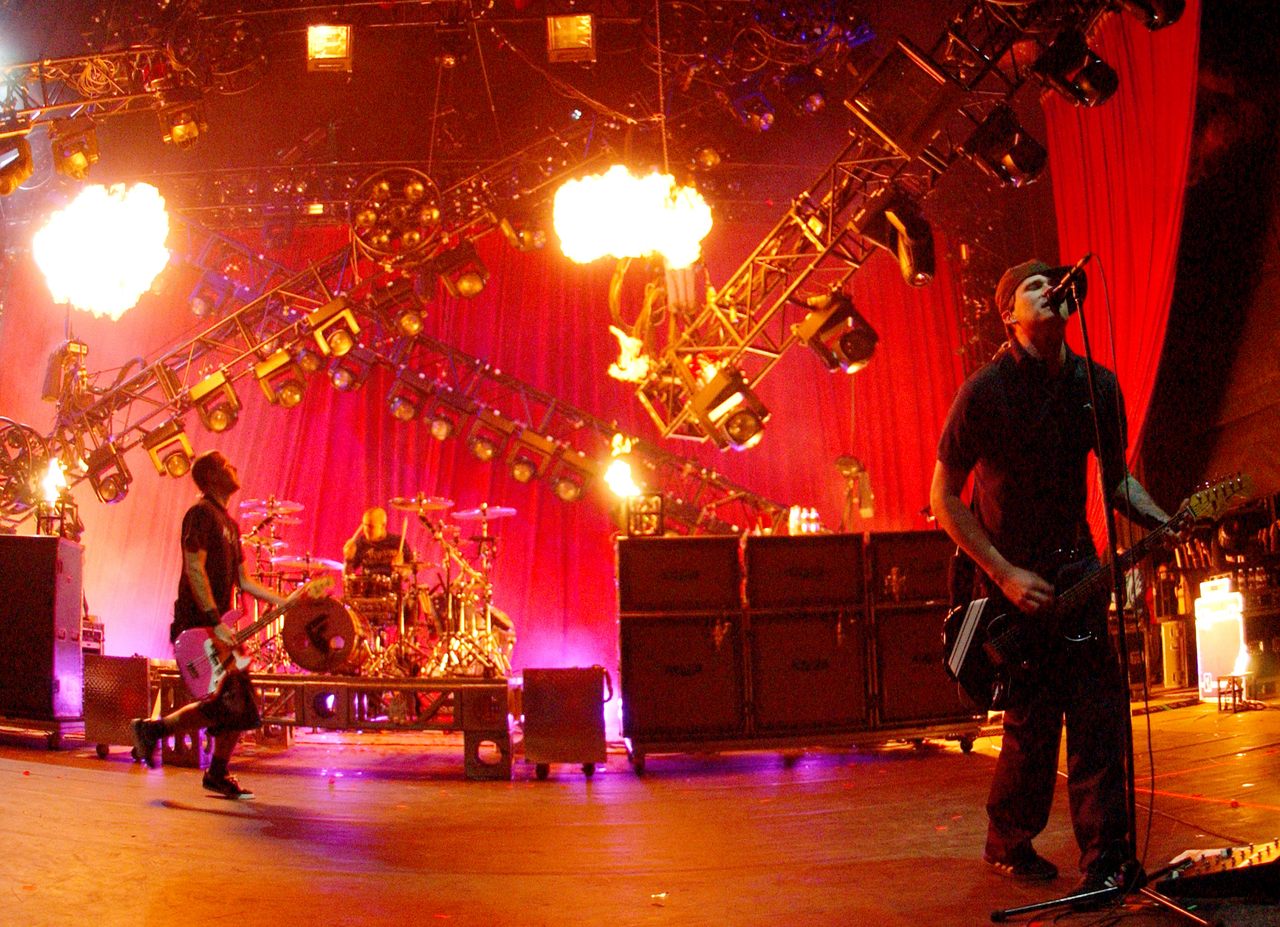



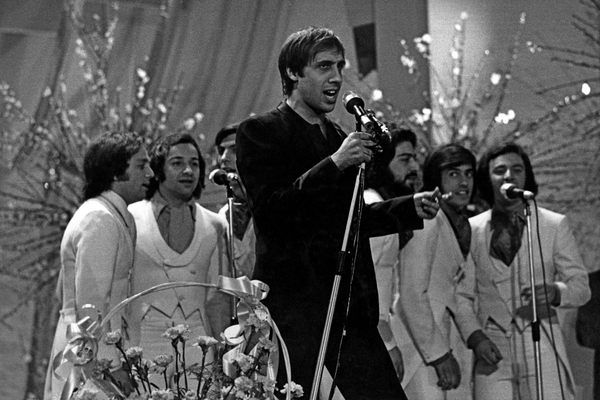


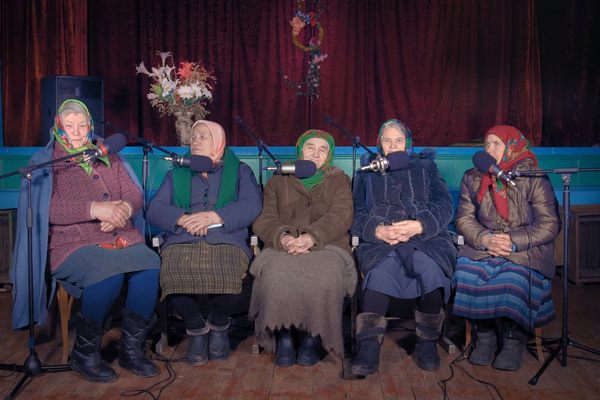
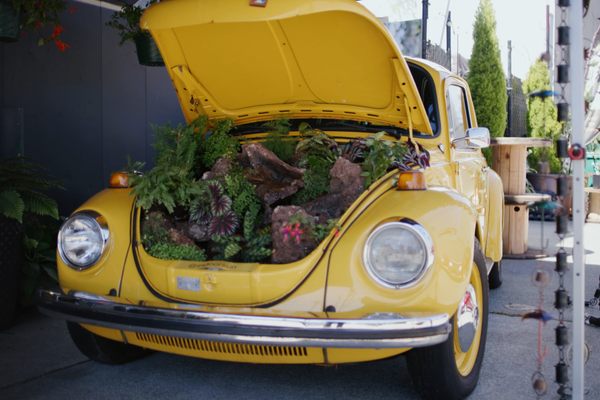



Follow us on Twitter to get the latest on the world's hidden wonders.
Like us on Facebook to get the latest on the world's hidden wonders.
Follow us on Twitter Like us on Facebook